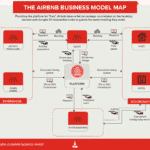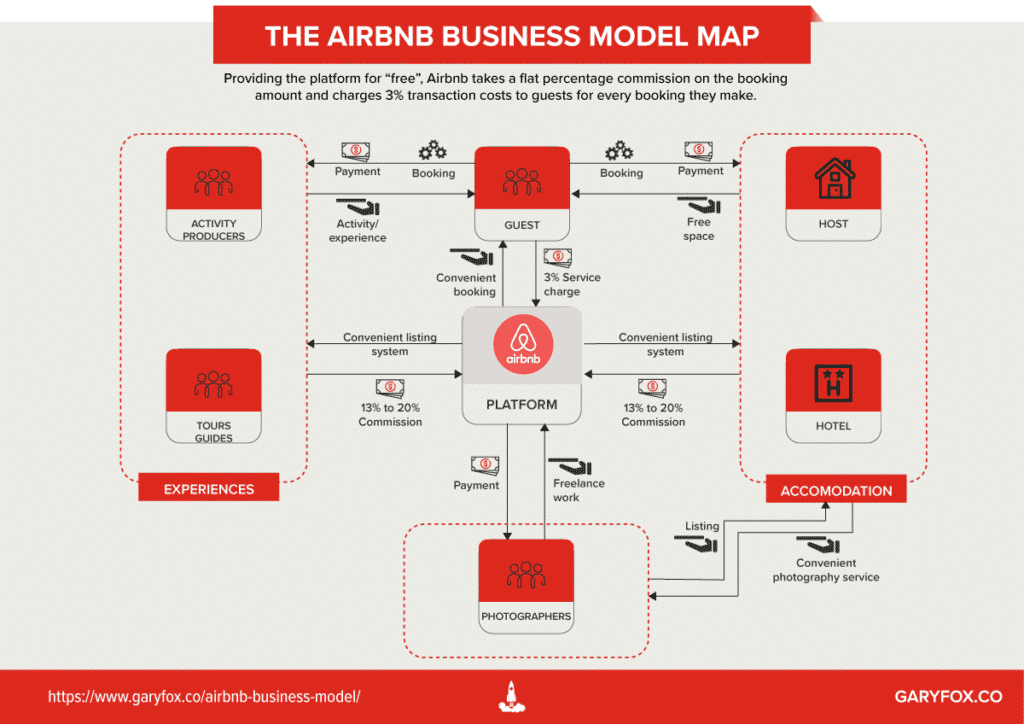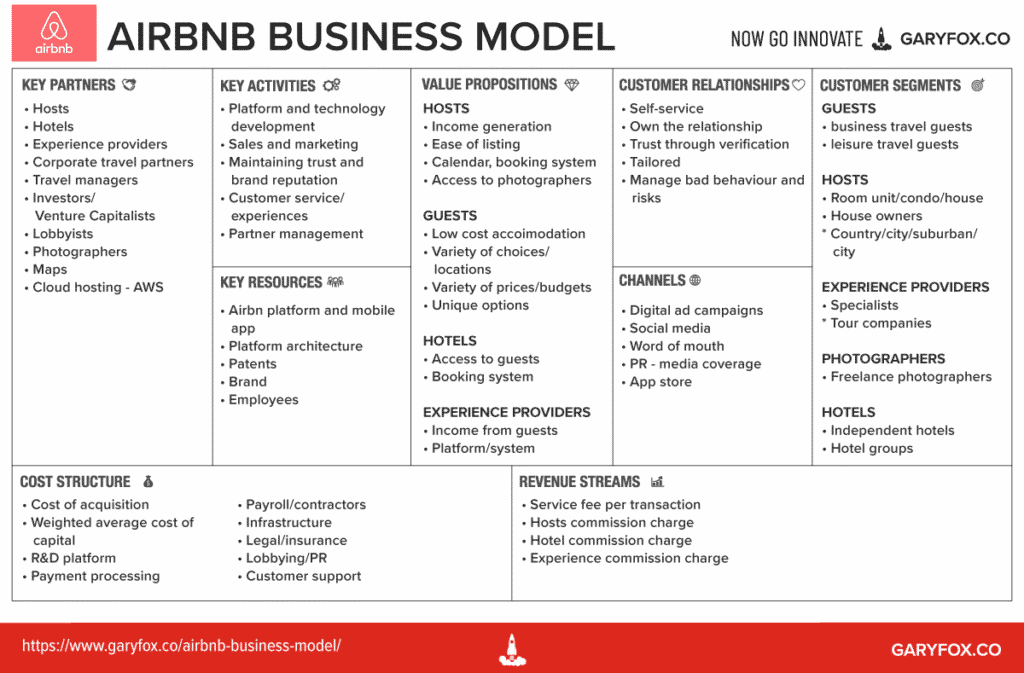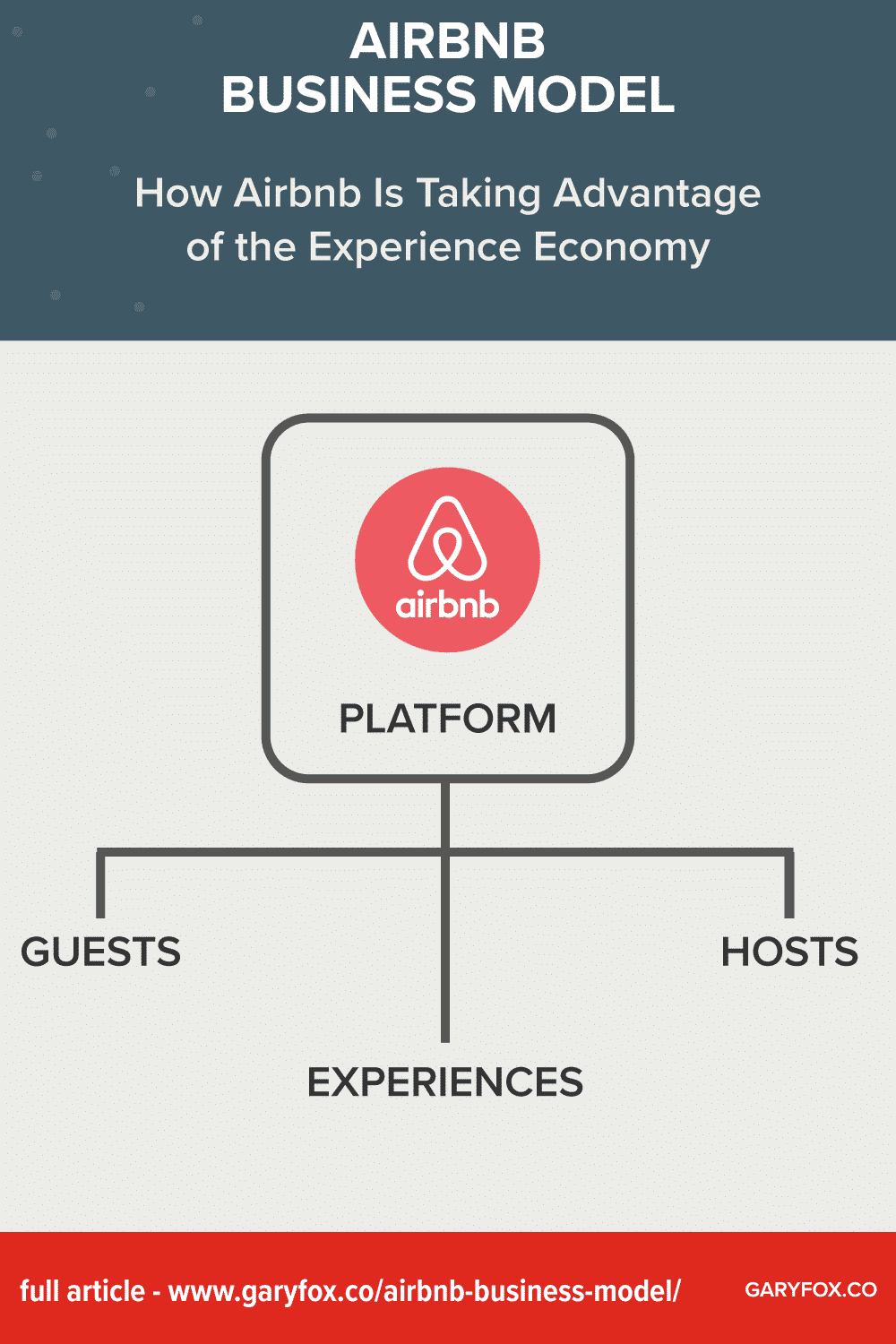The Airbnb business model immediately appealed to avid travellers who wanted not only better prices than hotels but unique experiences.
Founded in 2008 Airbnb has gone on to become a global brand that is used by millions around the world. At its heart, it is a platform business model that connects hosts with people seeking accommodation.
Brian Chesky and Joe Gebbia, are now the company’s CEO and chief product officer, respectively.
Noteworthy: In the first quarter of 2019, Airbnb actually beat Expedia in terms of booked room nights.
Table of Contents
What Is The Airbnb Business Model?

The Airbnb business model is a two-sided marketplace that connects people travelling with hosts and experience providers.

Shifts in the Airbnb Business Model
Originally the Airbnb business model based on homeowners renting space to people who were travelling. However, since there humble beginnings in 2008, Airbnb has progressively moved into the hotel market.
Hotels and owners and commercial groups can now list their rooms on Airbnb. Airbnb is now competing directly with other hotel booking sites such as booking.com.
People are increasingly interested in taking part in activities that create shared memories. As a result, in 2016 Airbnb launched experiences. Now they actively recruit experts to provide a range of experiences for Airbnb guests.
Activities range from cooking classes to graffiti tours to painting and much more. The range and depth of experiences available creates a new ecosystem of partners and opportunities for Airbnb and its customers.
Problem With Airbnb’s Legality
Despite strong growth, Airbnb still has challenges to face. There are some cities and countries cracking down on Airbnb usage. This is because the service Airbnb provides can be considered as short-term renting, and as a result, hits a variety of legal issues.
As such, it’s worth double-checking if the destination you’re going to is okay with Airbnb before renting. Some unfortunate homeowners have met legal trouble after they unknowingly let out their properties without realizing it’s illegal in their city to do so.
The Airbnb business model and its IPO will increase the pressure on Airbnb to expand geographically. Airbnb will, therefore, require considerable legal expertise that relates to each Country.
Quick Facts On Airbnb
Before we go into the detail of the Airbnb business model, let’s take a quick look at the scales of the business. In 2020, Airbnb is expected to go public with a valuation of $35Bn.
However, the Airbnb story started in back in 2008, when the two founders, Joe Gebbia and Brian Chesky (Nathan Biecharczyk was invited to join later) couldn’t pay rent.
They set up a simple website with a map and rented out three mattresses and promised home-made breakfast. Three people came and they decided to build on it.
They refined the website with money from selling cereal boxes during the presidential campaign in 2008, and took high-quality pictures of the rented space to boost click-rates.
Wit a relatively short time, the Airbnb business model went viral and in the winter of 2012, Airbnb overtakes Hilton Hotels in nights booked.
- Airbnb was founded in 2008 by Brian Chesky, Joe Gebbia, and Nate Blecharczyk.
- Airbnb has 31 offices across the world.
- $35Bn – valuation.
- Airbnb offers listings in over 191 countries.
- How many cities is airbnb in? Airbnb has homes in 81,000 cities in 2018.
- 700,000 companies use Airbnb for work.
- 88% of Airbnb’s reservations are for groups of two to four people
- Airbnb total Funding $4.8 Bn.
- 150M+ number of total users on Airbnb.
- 2M+ total users stay in an Airbnb per night.
- 6M+ global Airbnb listings worldwide.
- Only 11% of the nearly 500,000 US listings are reserved on a typical night.
- How many employees does Airbnb have? – 12,736 (2019)
What is the sharing economy?
The Airbnb business model is a good example of the sharing economy, an industry that is based on using digital platforms to unlock the value of underutilized assets. In Airbnb’s case, its business is connecting travellers with hosts renting space in their homes, generally on a short-term basis.
Renting assets to other people is something people have been doing for thousands of years. However, the rise of digital platforms has enabled millions of people to easily connect. In other words, two-sided platforms connect owners and seekers at scale. This is also referred to as peer-to-peer (P2P) business model.
Sharing economy means “What is mine is yours, for a fee” (The Economist) and has become a driving force behind a range of new business models. In 2011, sharing was nominated as one of the “10 ideas that will change the world“. The most common revenue model of a platform business is to charge a service fee.
Mission & Core Values:
Airbnb is more than an affordable travelling accommodation option. Through facilitating access to distinctive spaces and local culture, Airbnb aims to enable travellers to “feel at home anywhere you go in the world” by building connections with local hosts, gaining access to distinctive spaces and culture of their destinations.
Airbnb Business Model Canvas

The Airbnb business model canvas explains the key partners, key activities, key resources, value proposition, customer relations, channels and customer segments of Airbnb. Also, the cost structure and revenue streams of the Airbnb business model.
how does Airbnb work?
- Hosts list out their property details on Airbnb along with other factors like pricing, amenities provided etc.
- Airbnb provides the option to use a professional photographer(if available) to the property location in order to take high-quality photographs.
- Travellers search for a property in a location they wish to stay and browse available options according to price, amenities etc.
- Booking is made through Airbnb and the traveller pays the amount listed by the host and an additional transaction fee of three per cent.
- Host approves the booking. Traveller stays there and finally, Airbnb pays the amount to the host after deducting their commission.
- Reviews from host and traveller are provided so the broader community.
What Is Airbnb Plus?
Airbnb Plus program provides travellers with access to homes that recognises listings with exceptional quality, comfort and style. Airbnb has selection criteria of over 300 points for a host to be approved as a Plus listing.
The Airbnb Plus program is much more about recognizing homes that meet a high bar for quality and design. The Airbnb business model is evolving.
The Uber business model has seen an increasingly differentiated offer to cater to different customer budgets and tastes e.g. luxury cars, limousines etc. Likewise, Airbnb is adopting the same strategy and has created different levels of offers to appeal to customers with different budgets and lifestyle choices.
What Is Airbnb Luxe?
Airbnb Luxe offers pristine, expertly designed homes with luxury amenities, services, and a dedicated trip designer.
Airbnb is expanding its rental options to include some of the priciest and most luxurious accommodations on the planet. The new tier, called Airbnb Luxe, is designed for customers interested in spending more than $1,000 a night on thoughtfully designed, luxury private homes with scenic views and top-of-the-line amenities.
Airbnb Luxe is built on the deep expertise in luxury travel Airbnb gained from its acquisition of Luxury Retreats in 2017. This new tier has more than 2,000 handpicked homes around the world, each one passing strict evaluation across 300-plus criteria to meet standards in both design and function.
Airbnb business model canvas

Who are Airbnb’s customers?
Hosts:
- Hosts are the people who own property and want to make some money by renting out their available space.
- They can create a listing for their property on Airbnb, add property details and set their own prices, check-in, check-out time etc.
- Hosts can accept or reject a booking after reading the reviews of the traveller or after going through their social profiles.
Travellers:
- Travellers are the people who book the listed available spaces from local hosts.
- Travellers have the option to search for a property by filtering them according to rent, amenities provided, location etc.
- Travellers can book a space by paying through the portal.
Freelance Photographers:
- Airbnb has a vast network of freelance photographers in all major cities of the world who go to a location and click high-definition photographs of the property.
- High-quality photographs result in higher booking levels for hosts and the freelance photographers are paid by Airbnb directly.
Experience Providers
- These are usually specialists within a local area that provide classes, tours or events.
- Experience providers are also rated by guests.
- They pay a 20% commission to Airbnb for all activities that are booked.
Hotels
- Hotel chains that want to list their rooms on Airbnb.
- Independent hotels.
Channels: How Airbnb Acquires Customers
The Airbnb business model relies upon a steady stream of regular guests making bookings.
Airbnb run campaigns across a variety of paid channels including Google AdWords and Facebook Ads.
In the first quarter of 2019, the company’s sales and marketing spend rose 58 per cent to $367 million and was on track to be a record year with potential to hit over $1.5Bn in ad spend.
The main channels used by Airbnb are:
- Google Search Marketing Ads (over 54% of all bookings)
- Facebook Ads
- Social media ads (not Facebook)
- Promotional offers
- Affiliate Model / Refer and earn offers
Some ways that Airbnb could improve on their advertising include experimenting more with Facebook/Instagram ads e.g. creative, audiences, and remarketing. Some experimentation ideas that are uniquely suited to Facebook/Instagram: video advertising, influencer marketing, and profile-based advertising.
Customer relationships
A key factor for customer relationships has been the ability to ensure high-levels of trust between for any transactions to take place. Conversely, if there are any issues it is important that these are dealt with quickly so customers do not damage the brand and its reputation.
Relevant for both sides:
- Deal with customer issues in a timely manner.
- Manage bad behaviours and risks.
- Transparency around privacy, personal data, etc
- Portray the desired company image through social and other media
Especially for the hosts
Customer relationships to the supply side (the hosts) will be mainly defined by what the platform does for them in terms of income while protecting their property from bad guests.
- The platform’s ability to generate income.
- Provide a vetting system to check quality of guests.
- Manage issues.
- Support in the on-boarding process.
- Help hosts to succeed in general and
- Help super hosts to stand out and be rewarded.
What’s Airbnb’s Value Proposition
The Airbnb business model has four distinct customer segments: hosts, guests, photographers and experience providers.
For all of these, the platform needs to provide a frictionless and efficient user experience.
- Enables owners to list their space on the platform and earn rental money.
- Airbnb provides insurance to listed properties.
- Gives cheap options to travellers to stay with local hosts.
- Facilitates the process of booking living space for travellers.
- Rating and review system for hosts and guests.
- User-friendly app and web-based structure.
Key Partners for Airbnb
The most important aspect of the platform is to balance both sides and grow both sides. Part of the growth and further diversification of the Airbnb offer e.g. Airbnb Luxe has come through the acquisition of other companies and the subsequent expertise, database and relationships they have integrated into their platform.
- Technical partners e.g. Amazon AWS cloud hosting.
- Investors.
- Lobbyists.
- Business travel partners.
- Insurance.
- Hotel chains.
- Hosts
- Photographers
- Guests
How Does Airbnb Make Money?
Airbnb makes money by charging guests a commission between 0% and 20% for their stays and charging hosts a 3% to 5% fee.
Like other online marketplace models, the Airbnb business model has proven highly scalable and profitable. The company makes money by charging guests a commission between 0% and 20% for their stays, and charging hosts a 3% to 5% fee.
Airbnb doesn’t reveal its total gross bookings. Airbnb claims more than 2 million people stay with its hosts every night, while on average, Marriott filled about 1 million of its 1.3 million rooms each night last year.
Airbnb business model analysis
The Airbnb Business Model is shifting as they harness the power of the platform towards a future where there is a more diverse range of experiences as well as accommodation.
Artificial Intelligence (AI) has become a critical part of managing pricing, customers and providing insights into operations and customer behaviour. Companies like Amazon have made heavy investments and made several acquisitions that strengthen their AI capabilities.
Surprisingly Airbnb has not made any acquisitions and this points to a possible weakness in its armoury for the future.
Airbnb Key Metrics
Bookings are the team’s North Star metric, which means that maximizing bookings within a given budget is the primary goal. The two most important input metrics that guide decision-making around how well the team is acquiring bookings are cost per acquisition (CPA) and return on ad spend (ROAS).
CPA or total costs / total bookings is the metric for how much it cost us to acquire a new booking. ROAS, or (revenue — costs) / costs indicates how much incremental revenue a campaign or channel generates compared to the cost of running the campaign.
Other metrics will be with the frequency and use of the app. In other words, how many bookings per app user per month.
Airbnb Acquisitions
In April 2019, invested $100M in the fast-growing Indian hotel chain Oyo, and in March bought the booking site Hotelnight.
In 2016, it also launched an “Experiences” arm that offers guests the opportunity to try cooking, tours or other activities in the destinations they visit.
- Accoleo (June 2011): Accoleo, based in Hamburg, offered an Airbnb-like platform for rental properties across Germany.
- Crashpadder (March 2012): a London-based version of Airbnb, to 7,000 hosts across 100 countries by the time Airbnb bought it.
- DailyBooth (July 2012): DailyBooth was a social media app built by Jon Wheatley and Ryan Amos that allowed users to photo-blog their “life in pictures.”
- Fondu (October 2012): Fondu, started by Gauri Manglik, Orion Burt, and Mike Lewis, was a Yelp-like website and mobile app.
- Localmind (December 2012): Localmind, founded by Lenny Rachitsky and Beau Haugh, was a question-and-answer tool that allowed people to ask about events happening in their neighbourhood.
- Pencil Labs (December 2014): Pencil Labs, founded in Cambridge, Massachusetts, by Carla Pellicano and Han Shu, created a scheduling app called Wyth that helped users coordinate meet-ups by syncing up their texts, emails, and calendars.
- Vamo (September 2015): Vamo, founded by former Facebook executive Ari Steinberg, was a travel website that helped people plan complex or multi-city vacations.
- Trip4real (September 2015): founded by Gloria Molins, Barcelona-based Trip4real was an online platform that connected travellers with local activities and experiences they could book ahead of time.
- Lapka (September 2015): Lapka was an obscure, boutique Russian design agency founded by Vadik Marmeladov that sought to redesign medical and other sensor-based devices “as affordable, accessible and innovative accessories.”
- ChangeCoin (April 2016): ChangeCoin, founded by Nick Sullivan, enabled users to tip people with a blockchain-based digital currency on social networks like Twitter and Reddit through a service called ChangeTip.
- Minbox (May 2016): Airbnb was quiet about the acquisition, which was first reported by Business Insider in January 2020. It’s not clear how Airbnb ultimately incorporated Minbox’s technology, if at all, either internally or into its product.
- Proprly (May 2016): Proprly, founded in 2013 by Randy Engler, was a property management service that helped short-term rental owners with cleaning, guest check-in, and other aspects of the rental process.
- Bold Financial Technologies (November 2016): Bold, started in 2014 by Sean Safahi and Noah Spirakus, aimed to make international payments safer and more convenient for large platforms with lots of recipients around the world.
- Luxury Retreats (February 2017): Montreal-based Luxury Retreats, founded by Joe Poulin, allows travelers to book extravagant vacation rentals in exotic destinations.
- Tilt (February 2017): Tilt, founded by James Beshara, Karolyn Baxter, and Khaled Hussein, was an online payments and crowdfunding platform that Beshara once told Business Insider was “the digital version of putting money in a hat.”
- fewoVista (April 2017): In 1998, a decade before Airbnb’s founders rented out an air mattress in their Los Angeles apartment, Lutz Ahrens and Martin Tischer launched fewoVista, one of Germany’s first online marketplaces for vacation rentals and apartments.
- Vacaleo (April 2017): in 2014, as more platforms like Airbnb were taking off, fewoVista founders Lutz Ahren and Martin Ticher started another, related company called Vacaleo. A “meta” search engine, Vacaleo let users hunt for vacation rentals across multiple sites, which its website claimed included more than six million listings.
- Deco Software (May 2017): With Deco, founders Devin Abbott, David Chen, Spencer Liolios, and Gavin Owens created a tool to speed up mobile app development and “bridge the gap between designers and engineers.”
- Trooly (June 2017): Trooly, the product of Savi Baveja, Nilesh Dalvi, and Anish Das Sarma, aimed to make background checks faster and more accurate by using machine learning to analyze information on individuals sourced anywhere from the dark web to public records.
- AdBasis (November 2017): With AdBasis, Jason Puckett and Joe DiVita built an ad testing and optimization platform that aimed to “bring a scientific process and approach to digital advertising creative.”
- Accomable (November 2017): Srin Madipalli and Martyn Sibley, two friends with spinal muscular atrophy, founded Accomable to make it easier for travelers with disabilities to find accessible places to stay.
- Koko (November 2018): Koko, founded by Fraser Kelton, Kareem Kouddous, and Robert Morris as an MIT project, was a tool that aimed to keep online communities safe “by using AI to identify bad actors and damaging content” in real time, according to its website.
- Eliot (November 2018): Eliot, founded by Edouard Tabet in 2017, was a real-time pricing calculator that, according to its website, predicted “short-term rental revenue, trends and price surge events.”
- Luckey (December 2018): Luckey is a property management software for short-term rentals based in Paris and started by Aurélien Malfait, David Barbe, and Félix Malfait.
- Gaest (January 2019): Gaest was a Danish startup that let people rent out meeting spaces for short periods of time, founded by Anders Boelskifte Mogensen, Chris Kjær Sørensen, Christian Schwarz Lausten, and Jonas Grau Sigtenbjerggaard.
- HotelTonight (March 2019): HotelTonight, founded by Christopher Bailey, Jared Simon, Samuel Shank, lets users find same-day deals on hotels near them.
- Urbandoor (August 2019): Urbandoor, founded by Erik Eccles, Benjamin Renaud, and Zack Chandler, was a marketplace that connected business travellers with furnished apartments for extended stays and relocations. Airbnb said the number of work trips taken on its platform tripled in 2016, climbing to 15% of total bookings. By acquiring Urbandoor, Airbnb added to its supply of business-friendly listings.
Summary of Airbnb Business Model
The Airbnb business model is progressively moving into the business listings having previously focused on consumers. The IPO and future acquisitions will demonstrate the direction and strategy for how Airbnb plans to utilize its platform for future growth.
